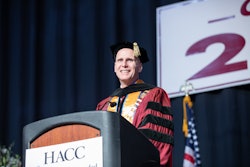In the fall of 2023, at Compton College, we invited Dr. Gina Garcia, professor of policy, politics, and leadership at Berkeley School of Education, University of California, Berkeley, to serve as our fall professional development day opening speaker — to provide insight for our campus as we continue our journey, serving as an Hispanic Serving Institution. During the presentation, Garcia talked about Dr. Robin D. G. Kelley’s notion of the “Freedom Dream,” an invitation to imagine an educational space that is grounded in racial equity, social justice, and collective liberation.
 Dr. Keith Curry
Dr. Keith Curry
Freedom Dreaming shows people that boundaries are imaginary and urges us to think and act in the language of our hearts. It acknowledges that, as we move forward, there will most certainly be intense push-back. As we dare to make these Freedom Dreams a reality, we must not listen to the naysayers (And I have many of those). It’s convening with people who share our vision and want to make it real. To me, innovation is the lifeblood of Freedom Dreaming. Freedom Dreaming isn’t about thinking outside the box. It is about taking a bold stance to break the old and create new systems and structures that support our students’ success.
I’m ready to share my unapologetic Freedom Dreaming thoughts, the full realization of unapologetic leadership, put into practice, in the name of student success. And while I am always trying to find ways to support community college students, I believe this work can be applied to all higher education institutions.
- Institutions of higher education budgets should be value statements and represent the needs of our students.
- Community college is free, and student aid covers the total cost of attendance.
- Community colleges build 24-hour urgent care facilities on our campuses to support students and the community. The facility would also address the mental health of our students.
- Community colleges would have housing on our campuses and work with four-year colleges/university partners to provide housing for our students at their campuses.
- When addressing students’ basic needs, community colleges would have grocery stores, food pantries, laundry, and shower facilities available to all students, 24/7.
- When possible, community colleges would grow fruit and vegetables on campus for students to grab and go throughout the day.
- Through the Free Application for Federal Student Aid (FAFSA), community college students should automatically qualify for the Supplemental Nutrition Assistance Program (SNAP).
- We need to double what we offer for Pell Grants. What we currently offer students is simply not enough for our students.
- SNAP partnership data-sharing agreements would be a requirement, and all county agencies would share data with their local community colleges.
- Every vendor on a community college campus would be required to accept SNAP.
- Every community college student is provided with one free meal per day at their institution.
- Provide academic and student support services to evening and weekend students online and in person.
- Ensure all community college campuses have robust childcare services for student parents.
- Each college will have a fund of at least $1 million to support emergency aid for students.
- Establish and maintain robust cross-sectoral partnerships with K-12, public housing, criminal justice, workforce development boards, and public health agencies to help lifelong learners access college however and whenever they need it.
- Guaranteed state and federal funding for regionally-relevant apprenticeships and internships at every community college.
- Each community college would have funding to support guaranteed income programs for student parents, who will receive at least $500 for six months during the year.
- At community college campuses, blue books, scantrons, and pencils would be free to all students.
- Students shouldn’t have to pay for printing, public transportation, or parking, as these items should be free.
- All high school students would have the opportunity to participate in dual enrollment that leads to pathways toward degrees, particularly Black and Hispanic/Latinx students.
- Community colleges will be provided with funds to support and finance teaching and learning innovation at our campuses.
- Provide additional academic support for students to address their reading and writing.
- Community colleges will have funding to support endowed chair positions for faculty.
- Establish faculty academies to train former community college students who are enrolled in master’s and doctorate programs and who want to become community college faculty.
- Four-year colleges/universities would be required to partner with local community colleges to offer cross-enrollment for students so community college students could take at least one class at a four-year college during their community college experience.
- The creation of a federal Black Serving Institution designation to support institutions of higher education.
- Accreditation and accountability will be viewed as a positive peer review process and not performative.
The demographics of our faculty, staff, and administrators reflect the student population we serve.
As I accept the Diverse: Issues In Higher Education’s 2024 Diverse Champions Award, I want to encourage us all to Freedom Dream.
My deepest Freedom Dream of all is to see our community colleges become the leading institutions for economic and social mobility, ensuring our students can access higher education at a price they can afford, earn a top-tier education, move forward into the careers of their dreams with livable wages, and give back to their communities. As practitioners, we should settle for nothing less.
Dr. Keith Curry is president/CEO of Compton College and Compton Community College District.










